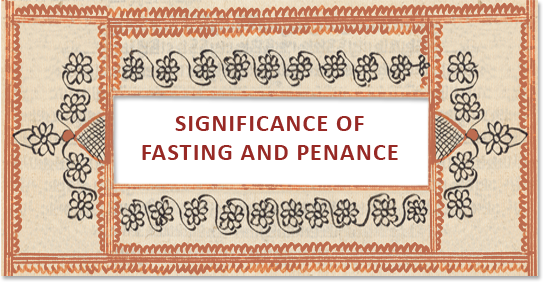


By : Prof. R.M. Pancholi
Vratopvasaiha kartavyo muhurdhehadmasttha | (Sh. Slo. 166)
“They should control their bodies and senses by frequent observance of vratas and fasts.” (Shikshapatri V. – 166)
In all religions of the world, fasting and penance have great significance. Fasting and penance purify the body and prepare the soul for adoration and worship of God.
In our holy fellowship we have been enjoined to observe fast and the Vrata (vow) of Ekadashi, the eleventh day of the bright half and of the dark half of every month. Monday is also a day of fasting for many or they have only one meal on that day. During the month of Shravan (September-October), we are required to observe the Vrat of fasting or to have only one meal a day. Many persons observe fasting on Saturday or at least eat only one meal a day.
This fasting is called Upavas. The word Upavas does not mean to go without food! It means to stay near the Divine. If you eat much you become idle and lethargic and cannot concentrate on meditation or adoration. In ordinary speech the word is spoken as Apavas, which is not correct. In Sanskrit ‘apa’ means away Apavas then unwittingly may mean being away from the guru or the God. On Upavas days we should eat light Falahar “fruit as food” and spend time in meditation or worship or reading which leads one to enlightenment. The Lord has ordained that on the day of the Upavas, one should never sleep during the day.
Upavasdine thyajya divanidra prayathnathaha (Sh. Slo. 80)
In Christianity also a period of forty days before Easter is called Lent – which is considered a period of adoration, fasting and penance. Christ suffered temptation in wilderness and did not yield to Satan’s allurement of good food and fleshly delights. Good Friday in April is the day of Christ’s Crucifixion. He came back to life the following Sunday. That Sunday is called Easter Sunday. The first day of the Lenten period is called Ash Wednesday. On this day the priest applies the ashes on the forehead of pious Christians, reminding them of evanescence of Life in this world but also of the promise of Life Eternal in Heaven for the devout.
During the early days of Christianity many saints went into wilderness during this period and spent time in caves of Thibia or Ethiopia meditating on the spirit of God. They maintained themselves only on roots and tubers. All pious Christians observe fast on Friday and abstain from their traditional food and have only vegetarian meals.
In Christianity love for food is considered one of the seven deadly sins – called Gluttony. In the middle ages the priests also observed vigils at night – Jagaran, keeping awake in contemplation of the Divine. Even the knights, the warriors who trained themselves as defenders of the faith, had to fast and keep vigil in the Church for the whole night before the title was bestowed on them.
In Jaina Sampradaya, fasting is given great importance. Their Paryushana (which means sitting with the religious sages in contemplation of the lives of Teerthankars) is a period of fasting and penance. The monks and Sadhvijis and also other Shravaks observe fast during the Chaturmas and Paryushana.
In Islam also rojas are enjoined on all pious Muslims. The whole month of Ramzan is the month of penance and fasting. Though they can eat after the sunset, during the day they do not take even a drop of water.
Fasting makes you forget the earthly worries. It helps you conquer the love of tasty food. Sarvendriyani jeyani rasana tu visheshathaha | (Sh. Slo 189) “They should control all senses specially the sense of taste.” (Shikshapatri V. – 189). It is a penance that strengthens the will. Temptation to eat is difficult to conquer for a beginner in Yoga. Fasting purifies the body and helps mind to concentrate in Dhyana of Shri Hari.
We are sure this comparative study of fasting and penance in other religions would inspire you to observe at least Ekadashi which bears special significance in Swaminarayan Sampradaya. It would keep you away from doctors and devils.